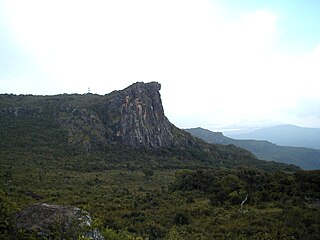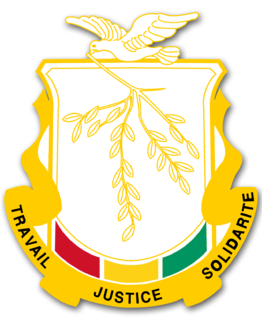African Socialist Movement was a political party in French West Africa. The MSA was formed following a meeting of the Section française de l'Internationale ouvrière (SFIO) federations of Cameroon, Chad, the Republic of the Congo, French Sudan, Gabon, Guinea, Niger, Oubangui-Chari, and Senegal; the meeting was held in Conakry from 11 January to 13 January 1957. At that meeting it was decided that the African federations would break with its French parent organisation and form the MSA.

Mount Loura is the northernmost point and highest peak at 1,573 metres (5,161 ft) in the Fouta Djallon in northern Guinea. It is 7 km from the prefecture of Mali-ville. It is part of a complex of mountains called the Massif de Tamgue, which rises to steep cliffs on three sides, and provides views into Senegal and Mali.
Gamal Abdel Nasser University of Conakry, is the largest university in Guinea and located in Dixinn Commune, Conakry, the Guinean capital. The name is generally shortened to the University of Conakry.
The Socialist Democracy of Guinea was a political party in Guinea. DSG was founded in the run-up to the 1954 legislative election by Abdoulaye Diallo, Chaikou Baldé and Ibrahima Barry. DSG was a continuation of the party led by Yaciné Diallo. DSG was the Guinean affiliate of the French Section of the Workers International (SFIO).
The Guinean Press Agency (AGP) is a press agency in Guinea. It was run by the government under Sékou Touré and provided daily news updates to the other government officials and international diplomatic corps. A revitalized press emerged during the coup of April 1984. The agency is still active as of November 2015.
The Guinean Entertainment Agency (AGS) was a government entertainment agency in Guinea.It was established in May 1973 to replace the former Syliart. It was run by the Ministry of Youth, Arts and Sports and supported artists and playwrights in Guinea as well as providing a pension to those who works were in accordance with the Democratic Party of Guinea.
Alfa is a title given to distinguished figures in Guinea, particularly in the Kankan Region. It has become known in Guinea as a title of respect, especially amongst the Maninka and Fulbé and is commonly given to scholars and learned and religious military leaders.
The Alfaya was the name given to the party from the mid-18th century that favored the clerical successors of the jihad leader Karamoko Alfa in the Imamate of Futa Jallon in what is now Guinea.
The Anglo-French Convention of 1882 was signed on 28 June 1882 between the United Kingdom and France. It confirmed the territorial boundaries between Guinea and Sierra Leone around Conakry and Freetown. However, it was never fully ratified by the French Chamber of Deputies although it was officially recognized by the British Foreign Office.
The Association of Guineans in France was one of two opposition groups from Guinea in exile in France during the regime of Sékou Touré. Like its counterpart, the Front for the National Liberation of Guinea, the association was composed of mainly exiled cabinet ministers and university graduates, discontent with Touré's regime.
Oumar Balde (1931–?) was a Guinean engineer. He served a director of the Highways Department and secretary-general of the Organization of States Bordering the Senegal River under Sékou Touré. After his arrest, he was neither tried nor sentenced, and is believed to have died in detention in Kindia.
Ousmane Baldé was a Guinean economist and politician. He was President of the Central Bank of the Republic of Guinea and served as a Minister of Finance. He was accused of being a mercenary in the Portuguese invasion of Guinea, arrested, and hanged without trial in 1971 along with Ibrahima Barry, Magassouba Morida, and others.
Sirah Baldé de Labé was a Guinean novelist and teacher. She studied to be a teacher in Rufisque, Senegal and became a pioneer for being the first woman to teach French in the former Fula Imamate of Futa Jallon during the French occupation. She is best known for her 1985 novel From One Futa Jalon to the Other.
Saïdou Bokoum is a Guinean writer. Born in Dinguiraye, in 1974 he published Chaîne, a novel about the plight of Africans living in France. He has published several works related to theatre.
Alioune Dramé was a Guinean economist and politician. He also served as an ambassador to Ivory Coast.
Ibrahima Sory Barry was a Guinean chief and politician. For many years he was a very prominent chief of Mamou until 1957 when he was appointed for more national and international duties. He served in the council of the Politburo of the First Republic of Guinea as Minister of Rural Economy from 1963.
Julius Nyerere University of Kankan (UJNK), also known as Université de Kankan is a university in Kankan, Guinea. It is named after Julius Nyerere, the first President of Tanzania.
The Soriya was the name given to the party from the mid-18th century that supported the successors of the war leader Ibrahim Sori in the Imamate of Futa Jallon in what is now Guinea.

Guinea has had four constitutions. The current constitution was approved by referendum on 19 April 2010 and formally adopted on 7 May.




